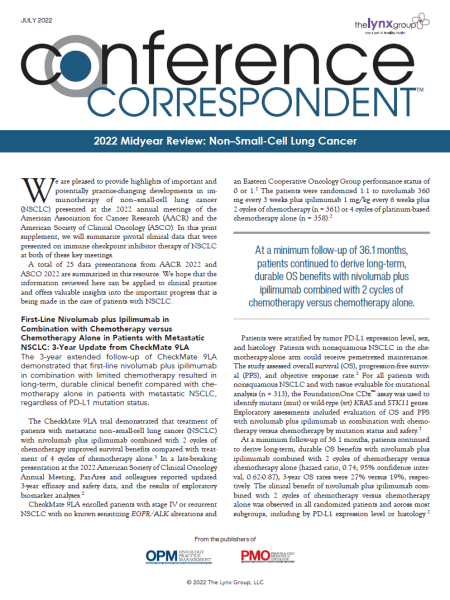In the treatment of non–small-cell lung cancer (NSCLC), 2 of the biggest advancements in recent years have included immune checkpoint inhibitors and targeted therapies for patients with oncogenic drivers. Immunotherapy is now a key treatment option for patients with advanced and metastatic NSCLC, but fundamental questions abound when it comes to the treatment of patients with sensitizing mutations.
At the 2020 Hematology/Oncology Pharmacy Association annual conference, Kelly Gaertner, PharmD, BCOP, BCPS, Oncology Clinical Pharmacy Specialist, Allegheny Health Network Cancer Institute, Pittsburgh, PA, discussed the intersection of these 2 therapies in NSCLC, focusing on patients with adenocarcinoma and epidermal growth factor receptor (EGFR) mutations.
Targeted therapy remains the preferred first-line treatment for patients with actionable oncogenic driver mutations, Dr Gaertner said, but can these patients derive the same benefit from immunotherapy as those without oncogenic drivers?
“When we talk about driver mutations, we’re talking about gene mutations and rearrangements involved in oncogenesis,” Dr Gaertner explained. “These mutations are responsible not only for the initiation, but the maintenance of cancer.”
Baseline testing for patients with newly diagnosed advanced lung adenocarcinoma, in addition to PD-L1 testing should include, at a minimum, testing for EGFR, RAS1, ALK, and BRAF1 mutations. “But the initial treatment of advanced NSCLC can very simply be broken down to—does the patient have a targetable oncogenic driver or not,” she emphasized.
If a targetable oncogenic driver mutation is present, targeted therapy is recommended in the first-line setting, independent of PD-L1 expression level, because those therapies have higher response rates and better tolerability than chemotherapy.
In NSCLC with EGFR mutations, targeted therapy has historically shown significant improvement in progression-free survival (PFS) versus platinum-based chemotherapy. Many first-line options have been approved by the US Food and Drug Administration, but osimertinib is preferred based on the 19-month PFS benefit that was seen in the FLAURA clinical trial.
For patients without targetable oncogenic driver mutations, immunotherapy—either as monotherapy or in combination with chemotherapy—is currently recommended in the first-line treatment setting, assuming patients are eligible for therapy with immune checkpoint inhibitors.
Driver Mutations
“Three of the most studied markers that are predictive of response to immune checkpoint inhibitors include PD-L1, tumor-infiltrating lymphocyte [TIL] density, and tumor mutational burden [TMB],” Dr Gaertner stated. “PD-L1, while not perfect, is arguably the best biomarker we currently have, and is less likely to be expressed in EGFR-mutated tumors.”
TIL density provides a picture of a tumor’s immune phenotype. “When you hear of a hot tumor, that indicates a T-cell–inflamed tumor phenotype, which is more likely to respond to immune checkpoint inhibitors versus a cold tumor, which is non–T-cell inflamed,” she added.
EGFR mutation–positive cancers are more likely to have low levels of T-cell infiltration and a lower proportion of PD-L1–positive and CD8-positive TILs, which ultimately represent an immune cold tumor microenvironment.
TMB refers to the presence of somatic mutations in the genome, and provides a picture of the genome’s stability. The higher the TMB, the more mutations in the tumor.
“As a result, this means more neoantigens, more immunogenicity, and a higher likelihood of better results with immune checkpoint inhibitors,” Dr Gaertner said. For example, tobacco smoking is associated with increased TMB and better outcomes with immune checkpoint inhibitors, but EGFR is much more frequently encountered in light smokers or in never smokers.
Immunotherapy Remains Controversial
Only approximately 50% of key immunotherapy clinical trials in advanced NSCLC have included patients with driver mutations (EGFR or ALK), and of those, responses to immunotherapy in this subset of patients have been low. A phase 2 clinical trial of first-line pembrolizumab in a small number of patients with EGFR mutation–positive, PD-L1–positive (≥1%) NSCLC showed that pembrolizumab is not appropriate as first-line therapy in tyrosine kinase inhibitor (TKI)-naïve patients with sensitizing EGFR mutations, regardless of PD-L1 expression.
In the second-line or later setting, patients with EGFR mutation comprised small subgroups within several phase 3 clinical trials, but no PFS or overall survival benefit was reported with immune checkpoint inhibitors compared with docetaxel.
The IMpower150 trial is the only prospective, phase 3 clinical trial to evaluate immune checkpoint inhibitors in combination with chemotherapy and showed benefit in patients with TKI-refractory EGFR mutation–positive NSCLC, but this was an exploratory subgroup analysis in a small number of patients, and the findings warrant further investigation.
“Due to the high risk of toxicity, I wouldn’t recommend combining immune checkpoint inhibitors and targeted therapy outside of a clinical trial,” Dr Gaertner advised.
The National Comprehensive Cancer Network recommends targeted therapy in the first-line setting for patients with sensitizing EGFR mutations. After exhaustion of those therapies, platinum-based treatment is recommended. “They do, however, note that based on the IMpower150 subgroup analysis, an ABCP regimen may be an option for patients with EGFR mutations or ALK fusions following progression after initial treatment with a TKI,” she pointed out. “It’s also said that therapy with pembrolizumab, nivolumab, or atezolizumab is not recommended in patients with EGFR or ALK fusions as subsequent therapy.”
The role of immunotherapy after exhausting targeted therapies remains controversial, and the predictive value of PD-L1 expression remains unclear in the setting of actionable oncogenic driver mutations. “In these patients, we just don’t see PD-L1 correlate with responses like we do in unmutated patients,” Dr Gaertner said. “So, we’re on a never-ending search for continued evaluation and identification of predictive markers.”
“It doesn’t matter what a patient’s PD-L1 expression is,” Dr Gaertner concluded. “If they have a targetable oncogenic driver mutation, that trumps everything.”

